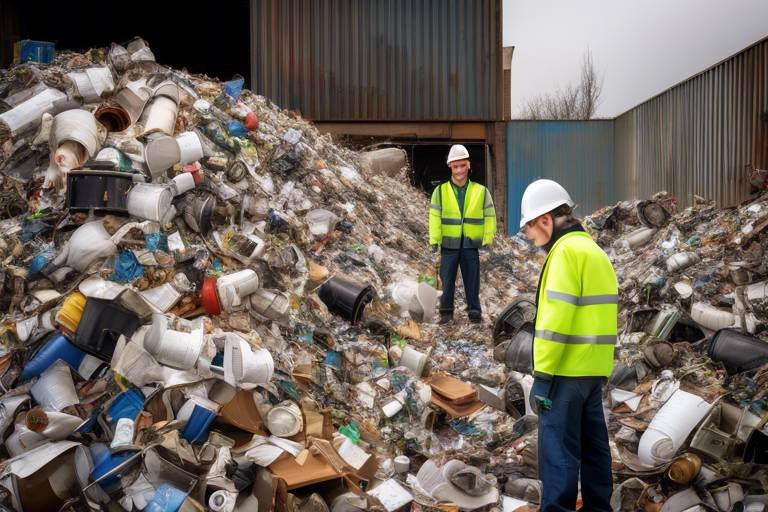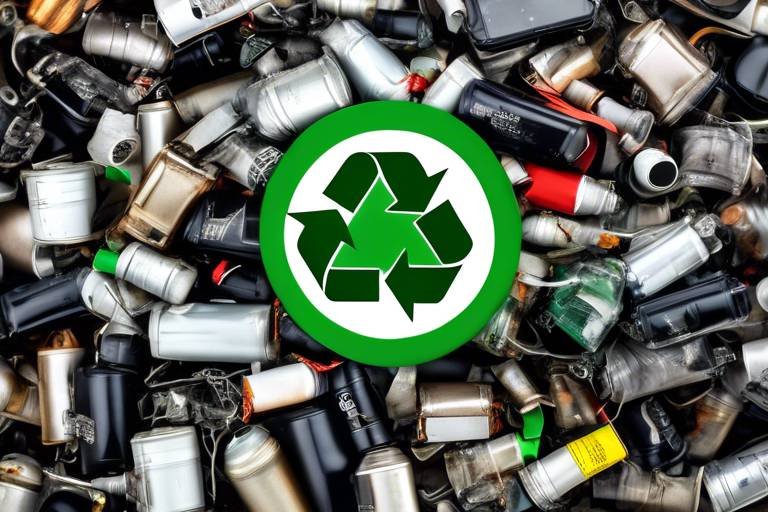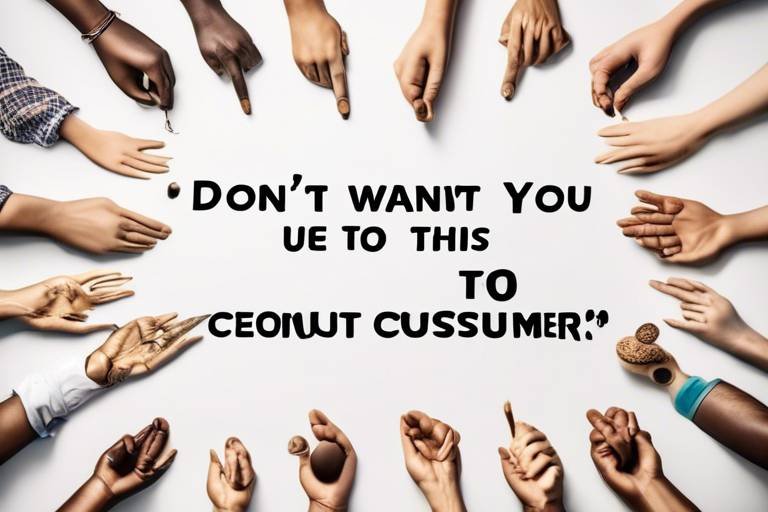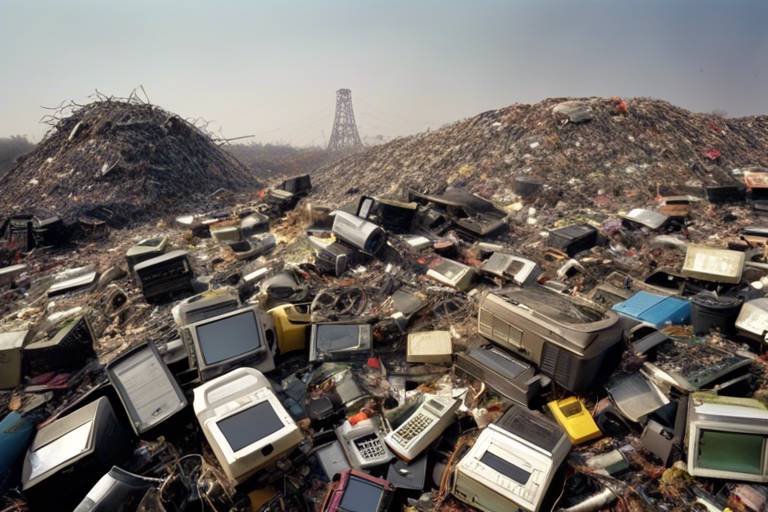What Role Do Citizens Play in Successful Waste Management?
Waste management isn't just the job of local authorities or waste management companies; it's a collective effort that requires the active participation of every citizen. Imagine living in a community where waste is managed efficiently—streets are clean, recycling rates are high, and everyone feels a sense of pride in their surroundings. This vision can only become a reality when citizens take on their responsibilities and engage in sustainable practices. So, what exactly does this look like? Let's dive into the crucial roles that citizens play in successful waste management.
First and foremost, citizens are the **frontline defenders** of their environment. By adopting simple yet effective waste disposal practices, individuals can significantly reduce the amount of waste that ends up in landfills. This means not just throwing trash in the bin, but also understanding what can be recycled and what should be composted. Each small action accumulates to create a larger impact. For instance, if every household in a community recycled just 10% more than they currently do, it could lead to a substantial decrease in waste generation. A community that actively participates in waste management fosters a culture of sustainability, which can inspire neighboring areas to follow suit.
Moreover, citizens play a pivotal role in **advocating for better waste management policies**. When individuals come together to voice their concerns about waste issues, they can influence local government decisions. This could mean pushing for more recycling bins in public spaces, advocating for community clean-up events, or even campaigning for stricter regulations on waste disposal. The power of the collective voice cannot be underestimated; when citizens unite, they become a force for change. This is particularly important in today's world, where environmental issues are at the forefront of public discourse.
In addition to advocacy, community involvement in waste management initiatives can lead to innovative solutions. Citizens can collaborate with local businesses and organizations to create programs that promote recycling and waste reduction. For example, establishing a community garden can not only beautify a neighborhood but also encourage composting of organic waste. The synergy between citizens and local entities can lead to creative strategies that benefit everyone involved.
Furthermore, educating oneself and others about waste management practices is an essential aspect of citizen involvement. Knowledge is power, and when citizens understand the **environmental consequences** of improper waste disposal, they are more likely to change their behaviors. This can be achieved through workshops, community meetings, and even informal discussions among neighbors. By sharing information and experiences, citizens can create a supportive environment that encourages responsible waste management.
Lastly, the role of citizens extends to volunteer opportunities within their communities. Participating in local clean-up events or recycling drives not only helps to reduce waste but also strengthens community bonds. When people work together toward a common goal, it fosters a sense of belonging and shared responsibility. Plus, these activities can be a lot of fun! Imagine spending a Saturday morning cleaning up a local park with friends and family, all while making a positive impact on the environment. It's a win-win situation.
In conclusion, the role of citizens in successful waste management is multifaceted and crucial. From adopting sustainable practices at home to advocating for better policies and participating in community initiatives, every action counts. By working together, citizens can create a cleaner, healthier environment for themselves and future generations. So, let's roll up our sleeves and take an active role in managing waste—because together, we can make a difference!
- What can I do to start participating in waste management? Begin by educating yourself on recycling guidelines in your area, reducing waste at home, and participating in local clean-up events.
- How can I encourage my neighbors to get involved? Organize community meetings or informal gatherings to discuss waste management issues and share ideas for improvement.
- Are there specific programs I can join? Look for local environmental organizations that offer volunteer opportunities related to waste management and recycling initiatives.
- What are the benefits of citizen participation in waste management? Increased community pride, improved environmental health, and the potential for influencing local policies are just a few of the benefits.

Understanding Waste Management
Waste management is a crucial aspect of modern society, encompassing a variety of practices aimed at handling waste in a sustainable manner. At its core, waste management involves the collection, transportation, processing, recycling, and disposal of waste materials. The primary goal is to minimize the impact of waste on human health and the environment while promoting the conservation of resources. Proper waste disposal is not just a matter of convenience; it is a vital responsibility that each citizen shares. Neglecting effective waste management systems can lead to dire environmental consequences, such as pollution, loss of biodiversity, and the depletion of natural resources.
Understanding the principles of waste management is essential for fostering a culture of responsibility among citizens. When we throw something away, it doesn't simply disappear; it has to go somewhere. This is where the importance of proper waste segregation comes into play. By separating recyclables, organic waste, and non-recyclable materials, we can significantly reduce the amount of waste that ends up in landfills. For instance, did you know that recycling just one ton of paper can save 17 trees? This is a perfect example of how our actions can have a ripple effect on the environment.
Moreover, the environmental consequences of poor waste management are alarming. Landfills emit methane, a potent greenhouse gas that contributes to climate change. Additionally, improper disposal of hazardous waste can lead to soil and water contamination, posing serious risks to public health. To illustrate this point, consider the following table that outlines the impacts of various waste management practices:
| Waste Management Practice | Environmental Impact |
|---|---|
| Landfilling | Produces methane, leachate, and land use issues |
| Incineration | Releases toxic emissions, requires energy |
| Recycling | Conserves resources, reduces pollution |
| Composting | Enriches soil, reduces landfill waste |
As citizens, we have the power to influence waste management practices in our communities. By actively participating in recycling programs, composting initiatives, and community clean-up events, we can contribute to a cleaner and healthier environment. It’s not just about individual actions; it’s about creating a collective movement towards sustainability. When we come together as a community, we can share resources, knowledge, and encouragement, making waste management a shared responsibility.
In conclusion, understanding waste management is the first step towards effective participation. By recognizing the importance of proper waste disposal and the consequences of neglecting this responsibility, we can empower ourselves and others to take action. As we delve deeper into the role of citizens in waste management, it becomes clear that our involvement is not just beneficial; it is essential for the health of our planet and future generations.

The Importance of Citizen Participation
When we think about waste management, it’s easy to assume that it’s solely the responsibility of local governments or waste management companies. However, the truth is that citizen participation is a crucial element in creating effective waste management systems. Just like a garden needs both soil and sunlight to thrive, our communities require active involvement from residents to cultivate a sustainable environment. By engaging in waste management practices, citizens can significantly contribute to reducing waste, enhancing recycling efforts, and fostering a healthier community overall.
Active participation from citizens leads to a ripple effect of positive outcomes. When individuals take responsibility for their waste, they not only reduce the amount of trash that ends up in landfills but also inspire others to follow suit. Imagine a neighborhood where everyone is committed to recycling and composting; the collective impact can be astounding! A community that works together can achieve higher recycling rates, lower waste generation, and a cleaner environment. This commitment to waste management can transform the way we view our waste and our role in managing it.
Moreover, when citizens are involved in waste management, they become more aware of the environmental consequences of their actions. This awareness can lead to a shift in attitudes and behaviors, creating a culture of sustainability. For instance, when people understand how their daily choices affect the planet—like the importance of reducing single-use plastics or the benefits of composting—they are more likely to adopt eco-friendly habits. This change in mindset can be likened to planting seeds of knowledge that will grow into a forest of sustainable practices.
To facilitate this involvement, communities can implement various strategies that encourage citizen participation. For example, organizing community cleanup events not only brings people together but also raises awareness about littering and its effects on the environment. Additionally, local governments can create programs that reward residents for recycling or reducing waste, making it more appealing for individuals to engage in these practices. When people see the tangible benefits of their actions—like cleaner streets and healthier parks—they are more likely to stay committed to participating.
In summary, the role of citizens in successful waste management cannot be overstated. Their participation is essential for reducing waste, promoting recycling, and fostering a culture of sustainability within the community. By actively engaging in waste management initiatives, citizens not only enhance their own quality of life but also contribute to the well-being of future generations. So, let’s take ownership of our waste and work together towards a cleaner, greener future!
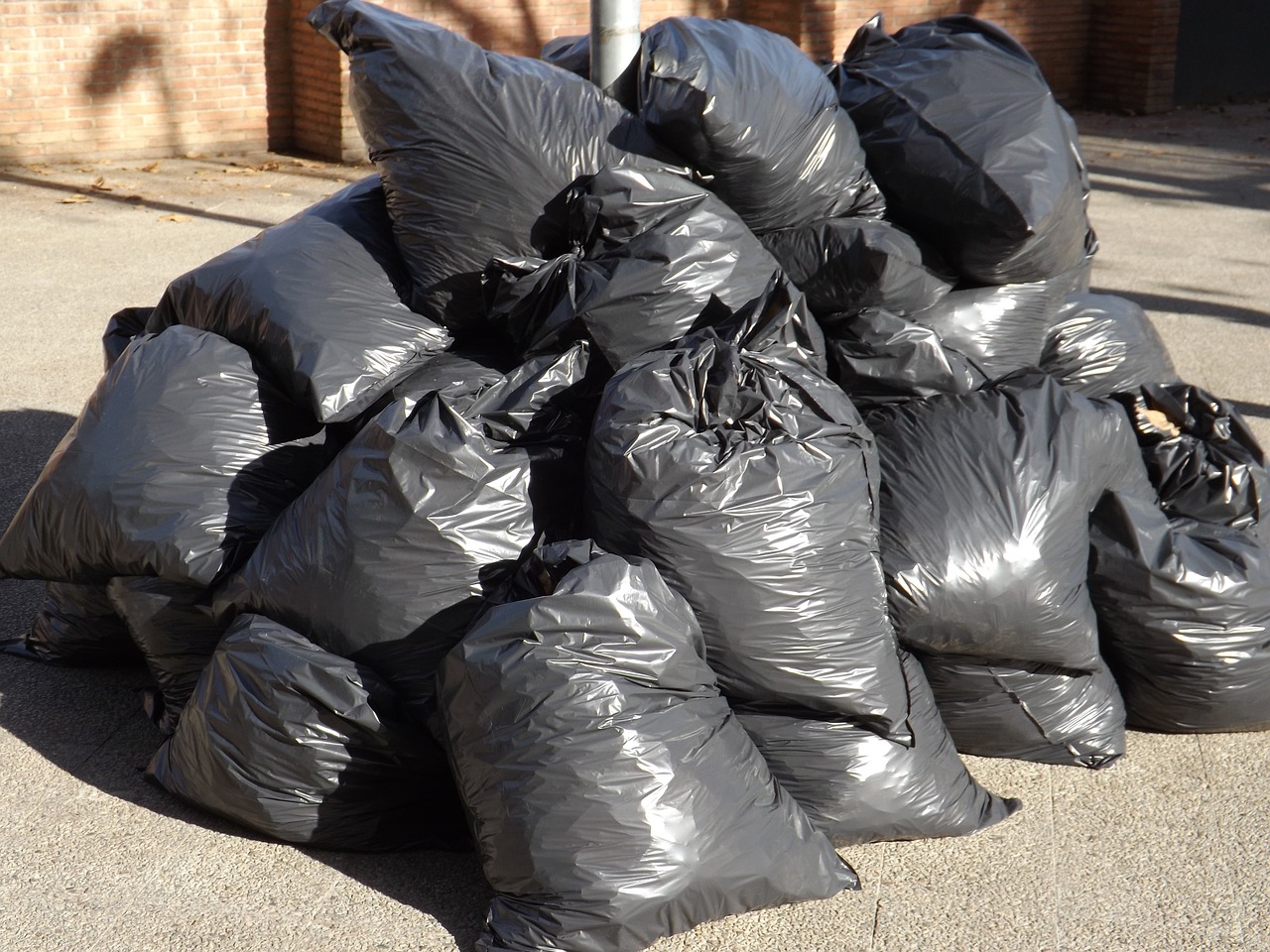
Community Awareness Campaigns
When it comes to effective waste management, are like the spark that ignites a wildfire of change. These campaigns serve as a bridge between the complexities of waste management systems and the everyday lives of citizens. By educating the community about the importance of proper waste disposal and recycling, we can foster a culture of responsibility and sustainability. Imagine a community where everyone understands the impact of their waste; it’s not just a dream, but a reality that can be achieved through targeted awareness initiatives.
One of the most effective ways to engage citizens is through interactive workshops and events. These gatherings provide an opportunity for hands-on learning, where participants can see firsthand how to sort their waste, compost organic materials, and even create DIY recycling projects. For example, a local community center might host a “Zero Waste Day” where families can participate in fun activities like crafting with recycled materials or learning how to make eco-friendly cleaning products. Such experiences not only educate but also build a sense of community and shared purpose.
Moreover, successful campaigns often leverage various media channels to reach a broader audience. Traditional media, such as flyers and local newspapers, can be combined with modern approaches like social media platforms. This multi-channel strategy ensures that the message resonates with different demographics. For instance, a campaign might utilize Instagram to share visually appealing infographics about recycling, while also running a Facebook event to invite locals to a cleanup drive. Here’s a quick look at some effective campaign strategies:
| Strategy | Description | Example |
|---|---|---|
| Workshops | Hands-on training sessions to educate citizens. | “How to Compost at Home” workshop. |
| Social Media | Utilizing platforms to spread awareness and engage. | Instagram challenges for recycling. |
| Community Events | Organizing local clean-up days or recycling drives. | “Clean Up Our Park” event. |
These strategies not only inform but also inspire action. When people see their neighbors participating in these initiatives, it creates a ripple effect. They feel compelled to join in, leading to a stronger community bond and a collective commitment to waste reduction. The goal is to transform the way individuals perceive their role in waste management—from passive observers to active participants.
In conclusion, community awareness campaigns are essential for cultivating a culture of sustainability. By providing the necessary knowledge and tools, we empower citizens to take charge of their waste management practices. When everyone in the community plays their part, the impact can be profound, leading to cleaner neighborhoods and a healthier planet.
- What is the goal of community awareness campaigns?
The primary goal is to educate and engage citizens in responsible waste management practices. - How can I get involved in local campaigns?
Check with your local community center or environmental organizations for upcoming events and volunteer opportunities. - Are these campaigns effective?
Yes! Studies show that communities with active awareness campaigns see significant improvements in recycling rates and waste reduction.

Social Media Initiatives
In today's digital age, social media has transformed the way we communicate and engage with one another. It has become a powerful tool for fostering community involvement in waste management practices. Imagine scrolling through your feed and coming across a vibrant post showing the benefits of recycling or the impact of littering on local wildlife. These eye-catching visuals can spark curiosity and motivate individuals to take action. Social media platforms like Facebook, Instagram, and Twitter provide an accessible space for communities to share information, inspire change, and promote responsible waste disposal.
One of the most effective ways to harness social media for waste management is through awareness campaigns. These campaigns can target specific issues, such as plastic pollution or composting practices, and encourage citizens to participate actively. For example, a local community might launch a hashtag campaign, such as #CleanUpOurTown, inviting residents to post photos of their cleanup efforts. This not only raises awareness but also creates a sense of community pride. When people see their neighbors getting involved, they're more likely to join in, creating a ripple effect of positive behavior.
Moreover, social media allows for real-time updates about community events, such as recycling drives or educational workshops. It serves as a platform for local authorities and organizations to disseminate information quickly and efficiently. For instance, a community can use social media to announce an upcoming recycling event, providing details about what items can be recycled and how to prepare them. This immediate access to information can significantly increase participation rates, as people are more likely to engage when they have all the necessary details at their fingertips.
In addition to raising awareness, social media can also be a space for sharing success stories. Highlighting individuals or groups who have made significant contributions to waste management can inspire others to take similar actions. For example, if a local school organizes a successful recycling competition, sharing the results on social media can motivate other schools to follow suit. This creates a culture of recognition and encourages ongoing participation, as citizens see the tangible impact of their efforts.
However, it's essential to remember that while social media can be an excellent tool for engagement, it must be used thoughtfully. Misinformation can spread just as quickly as accurate information, potentially leading to confusion about waste management practices. Therefore, community leaders and organizations should ensure that the content shared on social media is factual, clear, and actionable. By doing so, they can build trust and credibility within the community, making citizens more likely to participate in waste management initiatives.
In conclusion, social media initiatives play a vital role in enhancing community engagement in waste management. By leveraging these platforms effectively, we can educate citizens, promote responsible practices, and foster a sense of community involvement. The next time you scroll through your feed, consider how you can contribute to this digital dialogue about waste management and inspire others to join the movement!
- How can I get involved in local waste management initiatives?
You can start by following local community pages on social media, attending workshops, and participating in cleanup events. - What are some effective ways to promote recycling on social media?
Share informative posts, success stories, and engage your followers with challenges or hashtags related to recycling. - Can social media really make a difference in waste management?
Absolutely! It raises awareness, encourages participation, and fosters a sense of community, which are all crucial for effective waste management.
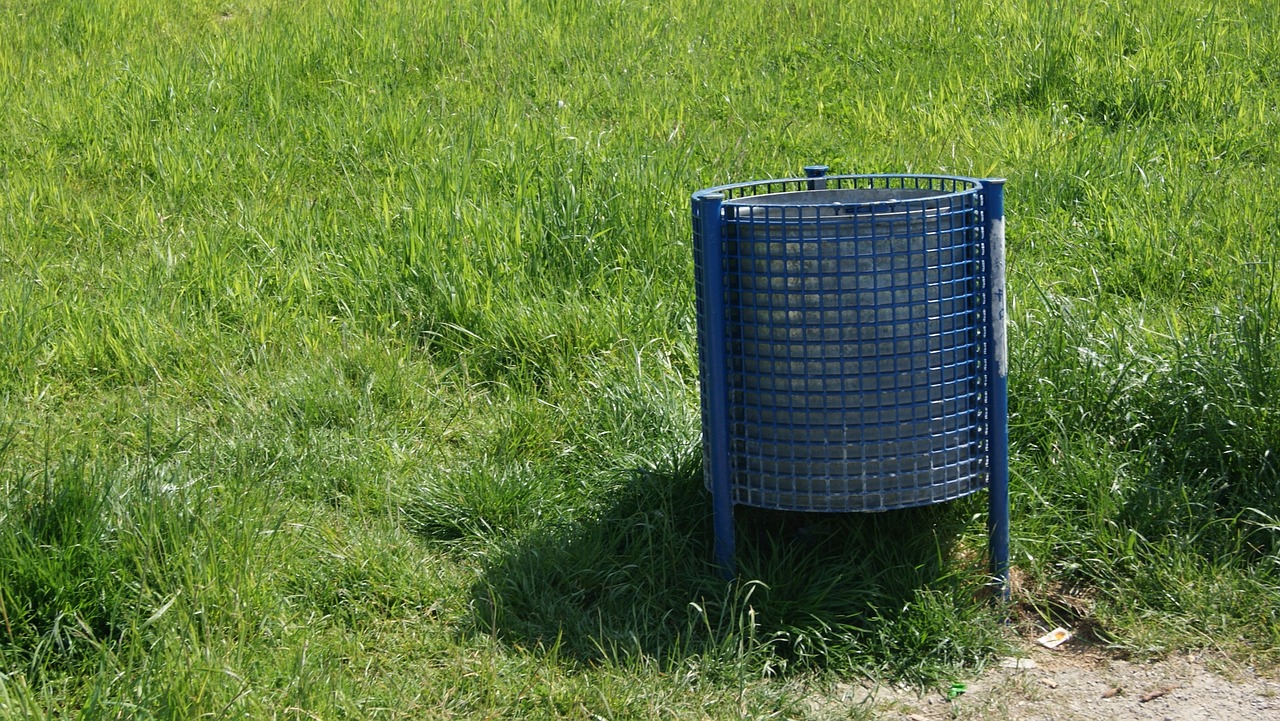
Workshops and Training Programs
Workshops and training programs serve as a powerful catalyst for enhancing community knowledge about waste management. Imagine a world where every citizen is equipped with the tools and understanding necessary to tackle waste issues head-on. These interactive sessions not only impart vital information but also foster a sense of responsibility among participants. They create an environment where learning is engaging and practical, allowing attendees to grasp the intricacies of waste segregation, recycling processes, and composting techniques.
One of the key benefits of these workshops is their hands-on approach. Participants often get the chance to engage in practical activities, such as sorting waste into different categories or creating compost from organic materials. This experiential learning can be more impactful than traditional education methods. For instance, when people physically interact with waste materials, they become more aware of the consequences of their disposal choices and how even small changes in behavior can lead to significant environmental benefits.
Moreover, workshops can be tailored to fit the specific needs of different communities. Whether it's a rural area struggling with agricultural waste or an urban setting dealing with household refuse, these programs can address local challenges directly. By understanding the unique waste management issues in their area, participants are more likely to implement what they learn, leading to measurable improvements in waste reduction and recycling rates.
To illustrate the impact of workshops, consider a recent initiative in a suburban neighborhood where a series of training sessions were held. The program not only educated residents on the importance of recycling but also provided them with the necessary tools—like bins and composting kits. As a result, the community saw a 30% increase in recycling participation within just a few months. This kind of success story highlights how effective workshops can be when they are well-structured and community-focused.
Furthermore, these training programs can also serve as a platform for community bonding. When residents come together to learn about waste management, they often share personal stories and experiences, fostering a sense of camaraderie. This social aspect can lead to the formation of local groups dedicated to ongoing waste management efforts, ensuring that the momentum built during workshops continues long after the sessions have ended.
In conclusion, workshops and training programs are not just educational tools; they are essential components of a successful waste management strategy. By equipping citizens with the knowledge and skills they need, communities can drive significant change, leading to a more sustainable future. So, if you ever get the chance to participate in one of these programs, seize it! You might just find yourself becoming a champion for your community’s waste management efforts.
- What types of topics are covered in waste management workshops?
Workshops typically cover a range of topics including waste segregation, recycling techniques, composting, and the environmental impact of waste. They may also address local waste management policies and initiatives.
- Who can attend these workshops?
Workshops are usually open to all community members, including children, adults, and seniors. Some programs may be tailored specifically for schools or local organizations.
- How can I find a workshop near me?
Check with local environmental organizations, community centers, or municipal waste management departments for information on upcoming workshops in your area.
- Are there any costs associated with attending?
Many workshops are free to attend, especially those organized by non-profits or local governments. However, some may charge a nominal fee to cover materials.

Volunteer Opportunities
When it comes to making a tangible difference in waste management, volunteering is one of the most impactful ways citizens can contribute. Not only does it foster a sense of community, but it also empowers individuals to take responsibility for their environment. Imagine transforming a neglected park into a vibrant green space or turning a litter-strewn beach into a clean haven for families and wildlife. These are just a few examples of how volunteer opportunities can lead to significant changes in our surroundings.
Many local organizations and community groups regularly host events that call for volunteers to participate in various waste management initiatives. These events can range from community clean-up days, where volunteers gather to pick up litter in public spaces, to recycling drives that encourage residents to sort and dispose of their waste responsibly. By getting involved in such activities, citizens not only contribute to cleaner neighborhoods but also inspire others to join the cause.
Moreover, volunteering offers a unique chance to learn about waste reduction techniques and sustainable practices firsthand. For instance, participating in a workshop organized by a local environmental group can provide valuable insights into composting, recycling, and waste segregation. Engaging in these hands-on experiences equips volunteers with the knowledge they need to advocate for responsible waste management in their own households and communities.
Here are some popular volunteer opportunities that citizens can consider:
- Community Clean-Up Events: Join local efforts to clean parks, streets, and beaches.
- Recycling Drives: Help organize events that encourage residents to recycle their waste properly.
- Educational Workshops: Assist in teaching others about sustainable waste management practices.
- Composting Initiatives: Participate in or lead projects that promote composting organic waste in your community.
In addition to these activities, many organizations also offer ongoing volunteer roles, such as becoming a waste management ambassador. In this role, individuals can advocate for better waste practices, educate others in their community, and serve as a bridge between local authorities and residents. This kind of engagement is crucial for fostering long-term change and ensuring that waste management strategies are effective and inclusive.
To sum up, volunteering in waste management not only helps clean our environment but also builds a stronger, more informed community. It’s a win-win situation where everyone benefits, and the planet breathes a little easier. So, if you’re looking to make a difference, consider reaching out to local organizations and see how you can contribute your time and energy to this important cause.
1. How can I find local volunteer opportunities in waste management?
You can start by checking with local environmental organizations, community centers, or municipal websites. Many of these groups regularly post volunteer opportunities, events, and initiatives related to waste management.
2. What skills do I need to volunteer for waste management?
No specific skills are required to volunteer; however, a willingness to learn and participate actively is essential. Many organizations provide training and resources to help you get started.
3. Can volunteering in waste management lead to job opportunities?
Absolutely! Many volunteers gain valuable experience and connections that can lead to job opportunities in environmental fields. It’s a great way to build your resume and network with like-minded individuals.
4. Is there an age requirement for volunteering?
Most volunteer opportunities welcome individuals of all ages, though some may require parental consent for younger volunteers. Always check with the organization for specific age requirements.
5. What should I wear when volunteering for clean-up events?
It’s best to wear comfortable clothes that you don’t mind getting dirty, along with sturdy shoes. Depending on the location and weather, consider bringing gloves, a hat, and sunscreen.

Challenges in Citizen Engagement
Engaging citizens in waste management isn't as straightforward as it seems. It's a bit like trying to get a cat to take a bath—there are plenty of barriers that can make participation feel daunting or even impossible. One of the primary challenges is apathy and indifference. Many people feel that their individual actions won't make a difference in the grand scheme of things. This mindset can be a significant roadblock, as it leads to inaction. To combat this, communities need to foster a sense of ownership and responsibility among citizens. When individuals see that their contributions can lead to tangible results, they are more likely to get involved.
Another hurdle is resource limitations. Not every community has the budget to run extensive waste management programs or campaigns. This scarcity can limit the effectiveness of initiatives aimed at educating and engaging citizens. However, communities can creatively utilize existing resources. For instance, partnering with local businesses or schools can provide the necessary support to enhance engagement efforts. By pooling resources, communities can maximize their impact without breaking the bank.
Moreover, the complexity of waste management systems can create confusion among citizens. Many people simply don’t understand how to properly recycle or dispose of waste. This lack of knowledge can lead to frustration and ultimately disengagement. To tackle this issue, communities must prioritize education. Clear, accessible information about waste management practices can empower citizens to take action confidently. Workshops, flyers, and online resources can demystify the process, making it easier for everyone to participate.
Lastly, inconsistency in communication can further alienate citizens. If messages about waste management are sporadic or unclear, individuals may feel disconnected from the initiatives. Regular updates through community newsletters, social media, and local events can keep waste management at the forefront of citizens' minds. This consistent engagement can help build a community culture that values active participation in waste management.
In conclusion, while there are several challenges in engaging citizens in waste management, they are not insurmountable. By addressing apathy, resource limitations, confusion, and communication inconsistencies, communities can create an environment where everyone feels empowered to contribute to waste management efforts. The key is to foster a sense of community and shared responsibility, turning what might seem like an overwhelming task into a collective mission.
- What can I do to get involved in my community's waste management efforts?
Look for local organizations that focus on environmental sustainability, join community clean-up events, and participate in recycling programs. - How can I educate myself about proper waste disposal?
Attend workshops, read local guidelines on waste management, and follow reliable sources on social media for tips and updates. - What are some common misconceptions about recycling?
Many believe that all plastics are recyclable, whereas only certain types can be processed. Always check local recycling rules.

Addressing Apathy and Indifference
In the realm of waste management, one of the most daunting challenges we face is the pervasive apathy and indifference among citizens. It’s almost like trying to fill a bucket with holes—no matter how much effort we put in, it just doesn’t seem to hold. Many people are aware of the environmental issues stemming from poor waste management, yet they still choose to look the other way. So, what’s the deal? Why do so many individuals feel detached from the waste management conversation, and how can we ignite a spark of enthusiasm to drive change?
A significant reason for this indifference is the overwhelming nature of the problem. Waste management can feel like an insurmountable task, akin to trying to climb a mountain without any gear. When citizens perceive waste as just a “city problem” or a “government issue,” they often disengage, feeling that their individual actions won't make a difference. To combat this mindset, we need to shift the narrative. It’s crucial to emphasize that every small action counts—whether it’s recycling a plastic bottle or participating in a community clean-up. When individuals see their contributions as part of a larger solution, they are more likely to engage.
Moreover, community leaders and organizations play a pivotal role in addressing this apathy. They can implement targeted strategies to engage citizens effectively. For instance, hosting local events that combine fun with education can break down barriers and foster a sense of community ownership over waste management. Think of it as turning a mundane chore into a lively festival! Imagine a neighborhood block party where residents come together to learn about composting while enjoying food from local vendors. These kinds of initiatives not only inform but also create a sense of belonging and shared responsibility.
Another effective approach is to leverage storytelling. Sharing personal stories about the impact of waste on our environment can resonate deeply with individuals. When people hear testimonials from neighbors or local activists about how their actions have made a difference, it can inspire them to take similar steps. This human connection is vital; it’s like lighting a match in a dark room—suddenly, everything is illuminated, and the path forward seems clearer.
To further enhance engagement, communities can create platforms for citizens to voice their concerns and suggestions. This could be through town hall meetings, online forums, or social media groups. When people feel heard, they are more likely to participate. It’s essential to foster an environment where citizens can share their ideas and collaborate on solutions—after all, two heads are better than one!
In conclusion, addressing apathy and indifference in waste management is not just about providing information; it’s about creating a culture of engagement and responsibility. By making waste management relatable and showing its direct impact on our lives, we can motivate citizens to take action. It’s time to turn the tide and transform indifference into enthusiasm—because every little bit helps, and together, we can make a significant difference!
Frequently Asked Questions
- What are some effective ways to engage citizens in waste management? Organize community events, share personal stories, and create platforms for discussion.
- How can storytelling impact waste management initiatives? Sharing personal experiences can inspire others and make the issue more relatable.
- Why do people feel indifferent about waste management? Many perceive it as a larger systemic problem and feel their individual actions won’t make a difference.
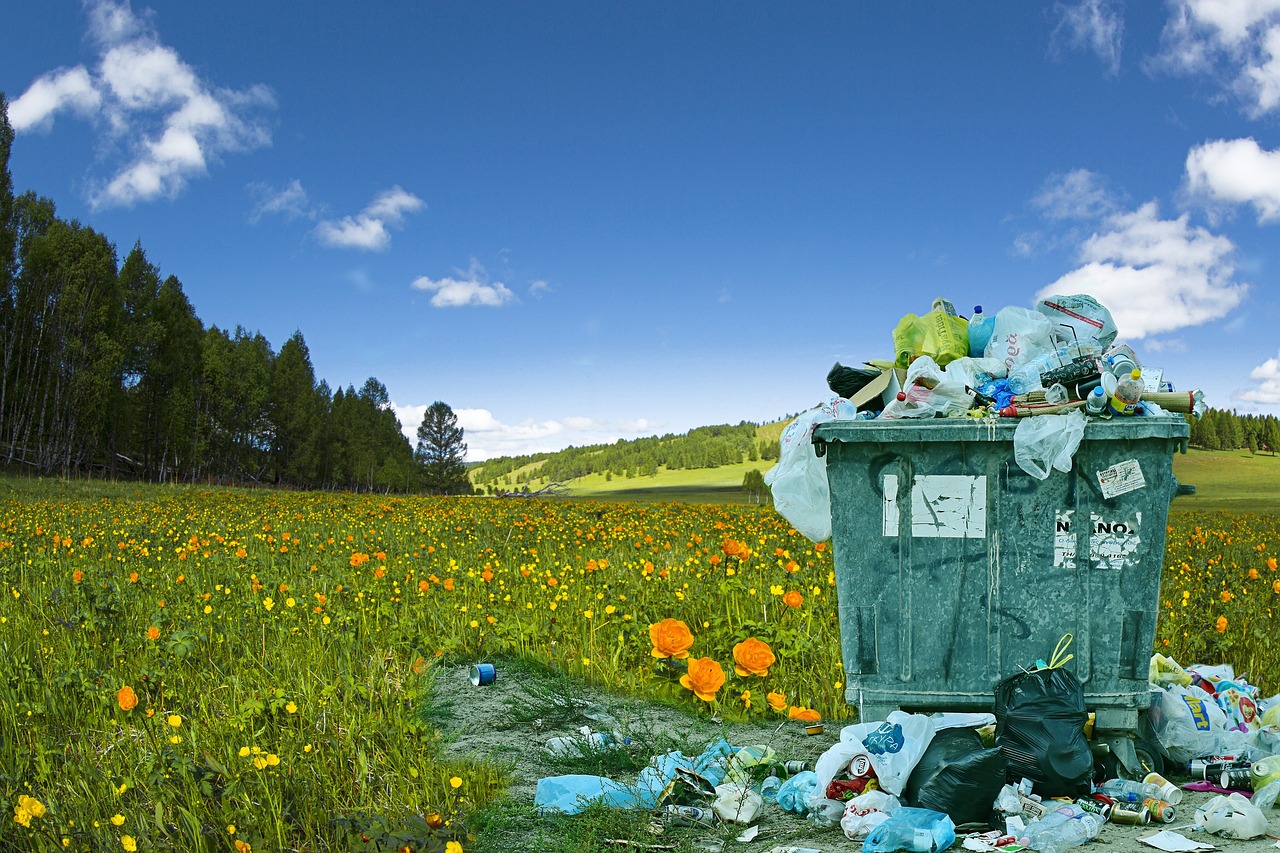
Resource Limitations
When it comes to engaging citizens in effective waste management, resource limitations can pose significant challenges. Imagine trying to build a house with only a handful of bricks; without the necessary materials, the structure simply can't stand. Similarly, communities often lack the essential resources—be it funding, manpower, or educational materials—that are crucial for fostering active participation in waste management initiatives. This scarcity can lead to a cycle of apathy and disengagement, where citizens feel that their efforts are futile or that they lack the means to contribute meaningfully.
One of the most pressing issues is financial constraints. Many local governments operate on tight budgets, which can limit their ability to implement comprehensive waste management programs. For instance, without sufficient funding, there may be a lack of proper waste bins, recycling facilities, or educational campaigns. Citizens might find themselves in a situation where they want to recycle but have no access to the necessary infrastructure. This disconnection between intent and capability can lead to frustration and, ultimately, disengagement.
Moreover, the availability of manpower is another critical factor. Volunteer programs can be a fantastic way to engage citizens, but if communities struggle to attract volunteers due to competing priorities like work and family commitments, these initiatives may fall flat. It’s like trying to organize a community picnic without enough people to set up the tables and chairs—no matter how great the idea, execution becomes nearly impossible.
To tackle these resource limitations, communities can adopt several strategies:
- Collaborate with Local Businesses: Partnering with local businesses can provide both financial support and volunteers for waste management initiatives. Businesses often have resources they are willing to share, especially if they see a potential for positive community impact.
- Seek Grants and Funding: Many organizations and government bodies offer grants specifically for environmental initiatives. Communities should actively research and apply for these funds to bolster their waste management efforts.
- Engage Educational Institutions: Schools and universities can be excellent partners in raising awareness and providing manpower. Students often seek community service opportunities, and working together can foster a sense of responsibility toward waste management.
By addressing these resource limitations, communities can cultivate a more engaged citizenry that feels empowered to take part in sustainable waste management practices. It’s essential to remember that every little effort counts, and when citizens are provided with the right tools and support, they can make a significant impact. The key lies in creating an environment where everyone feels they can contribute, no matter how small their role may seem.
Q1: How can I get involved in my community's waste management efforts?
A1: You can start by attending local meetings, volunteering for clean-up events, or participating in awareness campaigns. Check with your local government or community organizations for opportunities.
Q2: What are some common barriers to citizen participation in waste management?
A2: Common barriers include lack of awareness, financial constraints, and insufficient infrastructure. Addressing these issues can help improve participation rates.
Q3: How can social media help in waste management initiatives?
A3: Social media platforms can be used to spread awareness, share tips on responsible waste disposal, and organize community events. They serve as a powerful tool for engaging citizens.
Q4: Are there any educational resources available for learning about waste management?
A4: Yes, many organizations provide free resources online, including guides, webinars, and workshops. Local libraries and community centers may also offer educational programs.
Frequently Asked Questions
- What is the role of citizens in waste management?
Citizens play a crucial role in waste management by actively participating in recycling, reducing waste, and promoting sustainable practices in their communities. Their involvement can lead to more effective waste reduction strategies and improved environmental health.
- How can I get involved in local waste management initiatives?
You can get involved by volunteering for local cleanup events, participating in community awareness campaigns, or attending workshops focused on waste management. Engaging with local organizations can also provide opportunities to contribute to sustainable practices.
- What are some effective ways to raise awareness about waste management?
Effective ways to raise awareness include organizing community workshops, utilizing social media platforms to share information, and creating engaging campaigns that educate citizens on the importance of proper waste disposal and recycling.
- Why is community participation important for waste management?
Community participation is vital because it fosters a sense of responsibility among citizens. When people are actively involved, they are more likely to adopt sustainable practices, leading to a significant reduction in waste and a healthier environment.
- What challenges do communities face in engaging citizens?
Communities often face challenges such as apathy, lack of resources, and limited awareness about waste management. Overcoming these barriers requires targeted outreach, education, and the development of engaging programs to motivate citizen involvement.
- How can social media enhance community engagement in waste management?
Social media can enhance engagement by providing a platform for sharing information, promoting events, and encouraging discussions around waste management. It allows for real-time communication and can reach a broader audience, making it easier to mobilize community efforts.
- Are there specific training programs for citizens on waste management?
Yes, many communities offer workshops and training programs that educate citizens on waste management practices. These programs can cover topics like recycling, composting, and sustainable disposal methods, empowering individuals to make a positive impact.
- How can I motivate others to participate in waste management efforts?
Motivating others can be achieved by leading by example, sharing success stories, and highlighting the benefits of participation. Engaging friends and family in community events and making it a fun experience can also encourage more people to get involved.


